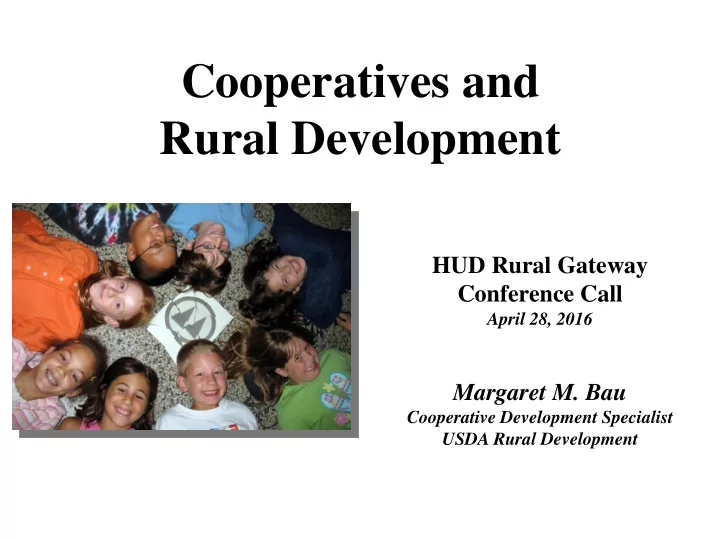

Cooperatives and Rural Development HUD Rural Gateway Conference Call April 28, 2016 Margaret M. Bau Cooperative Development Specialist USDA Rural Development
What is a Co-op? • A cooperative is a business owned and democratically controlled by the people who use its services. • Member - owner • Member - control • Member - benefits
Achieve together what you can’t accomplish individually
Various types of co-ops Defined by who owns the organization Producer Co-ops Consumer Co-ops Shared Services Co-ops 4 Worker Co-ops
Economic Development • Shared entrepreneurship – Spread the risk – Share the rewards • Create wealth – More than creating jobs – It’s about ownership – Patronage refunds • Sustainability Walter Vicente, a worker-owner at Opportunity Threads Cooperative Morganton, North Carolina
Survival Rate of Co-ops in Quebec Source: 2008 data from the Quebec Ministry of Economic Development, Innovation and Export; data tracked since 1990
Community Economic Development • Local ownership • Keep decision making local • Local investment – Pooled resources – Patient capital • Creating community Social enterprise of people with disabilities (and their coaches) operating five bakery co-ops in Toronto, Canada
Leadership Development • Understand financials • Policy development – Priority setting – Balancing personal needs with the common good • Democratic process – Meeting techniques – Communication – Wearing multiple hats Lois Clark and Donna Tompkins • Serve on committees Cooperative Care board meeting circa 2001 • Run for office
Since 1926… • 1867 - USDA’s first activity with co -ops • 1926 – Cooperative Marketing Act – Congress mandated USDA to assist with rural co-ops – Original focus on agriculture – As rural areas diversify, so too their co-ops 9
USDA- Support for Co-ops • Education – Free publications • Research and statistics – agriculture • New co-op development – Fund co-op development centers to provide technical assistance ($5.8 million in 2016) – Since 1993, about 35 centers funded by $100 million in Rural Cooperative Development Grants (RCDG) • Loans and grants to existing co-ops 10
Co-op Development Centers • Offer generalized services • Many have industry specialties – Farmers co-ops – Retail food co-ops – Worker, ownership conversions – Housing (resident owned communities) • Most utilize a “one - off” or SBDC approach – Client contacts center with an idea – Center helps recipient develop new co-op business “from scratch”
Rural Electric Co-ops in the US (1935-1945) Co-ops - a practical way to efficiently achieve a major goal
Why Do Electric Co-ops Matter? • Within a decade, rural America got electricity – At-cost, reliable – Member-owned • Urban corporations refused to run electric lines in rural areas – Not enough profit • Because of infrastructure costs, needed government – 1935 Rural Electrification Administration
A Once in a Generation Opportunity To build ownership, wealth, and local control across the country…
The Silver Tsunami Over the next two decades, 70% of privately held businesses will change hands – Retiring baby boomer business owners – Will touch rural America first
What will happen to those rural businesses? • Family members not interested – 15% conversion to second generation – 5% conversion to third generation • Sell to third party (competitor or private equity firm) – Glean customer list – Remove equipment – Close business
Why not sell business - over time - to employees? Worker co-op or democratic ESOP (pension plan) • For employees – Retain jobs – Active role in governance – Create long term wealth • For community – Ownership and decision making remain local • For owner – Equitable price – Legacy after lifetime of work
Where to focus our efforts? • Types of businesses – Viable companies • Financially stable • In an industry with a future – Owner nearing retirement age – Firms with 1-100 employees – “middle skill” jobs • Spread the word – to accountants, attorneys – to lenders – to economic development professionals
For More Information Margaret Bau Co-op Development Specialist USDA Rural Development (715) 345-7671 Margaret.Bau@wdc.usda.gov
Recommend
More recommend